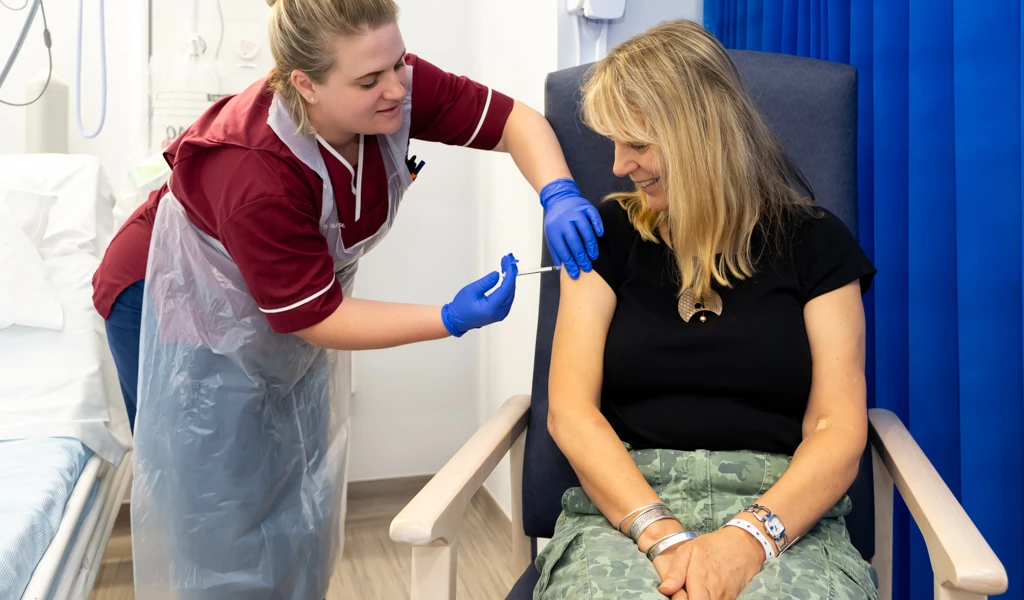Aspen, CEPI and the Bill & Melinda Gates Foundation expand commitments to improve access to vaccines in Africa

New funding supports technology transfer from Serum Institute to Aspen to manufacture routine vaccines in Africa, for Africa
Collaboration supports sustainable manufacturing capacity for African-produced vaccines for future epidemics and pandemics
Durban, South Africa - JSE Limited listed Aspen Pharmacare Holdings Limited ("Aspen") a global multinational specialty pharmaceutical company, announced that it will receive USD30 million from the Bill & Melinda Gates Foundation ("the Gates Foundation") and the Coalition for Epidemic Preparedness Innovations ("CEPI") to support its capabilities to manufacture lifesaving routine and outbreak vaccines for Africa.
The new funding from CEPI and the Gates Foundation, which includes USD15 million from each organization, will support a ten-year agreement between Aspen and Serum Institute of India Pvt Ltd ("Serum Institute") that aims to expand the supply and sourcing of affordable vaccines manufactured in Africa.
Through the partnership with Serum Institute, Aspen will manufacture and distribute four routine vaccines in Africa — Pneumococcal, Rotavirus, Polyvalent Meningococcal, and Hexavalent — with technology transfer activities initiating in early 2023. In addition to supporting the technology transfer of these routine vaccines, the funding from CEPI and the Gates Foundation will help sustain regional vaccine manufacturing capacity at Aspen for potential future outbreak response, with the intention of securing early access to African-produced vaccines in the event of a future public health emergency.
We thank both CEPI and the Gates Foundation for their commitment to support regional manufacture for Africa. Their commitment, together with our partnership with Serum, is an important first step in ensuring expanded and enduring equitable access to a pipeline of medicines and vaccines manufactured in Africa for Africans. Aspen has a proven capability of being at the forefront of pandemic preparedness for the Continent - from ARVs to COVID vaccines. This support will ensure we can continue to invest and expand our capacities, secure in the knowledge of future offtakes.
Africa CDC welcomes and wishes to congratulate Aspen, the Gates Foundation and CEPI on the conclusion of their respective agreements. These landmark agreements are a demonstration of Africa's, and in this instance, Aspen's ambition to further enhance Africa's vaccine localisation efforts, its intention to diversify the pipeline for Africa-specific vaccines and to improve Africa's ability to respond to pandemic outbreaks. All these are critical elements to establishing health security and security of supply on the African continent in line with the vision of our New Public Health Order.
The urgent need to diversify vaccine manufacturing so every region can manage its own health security is one of the most significant learnings from the inequity of the COVID-19 pandemic response. CEPI is working with our partners at Africa CDC to support the expansion of vaccine manufacturing on the continent, and our collaboration with Aspen, the Gates Foundation and Serum Institute will help to deliver a sustainable and resilient business model capable of both producing routine and outbreak vaccines in Africa, for Africa.
Expanding the availability of affordable, high-quality vaccines that meet the needs of local communities is one of the best ways to improve health outcomes and reduce preventable deaths. We're very pleased to support this agreement between Aspen and Serum Institute, which has the potential to expand vaccine production and supply in Africa, increase vaccination rates, improve pandemic preparedness, and broadly strengthen global health security.
Over the past two decades, the increased globalization of vaccine manufacturing has generated more reliable vaccine supplies at a lower cost, helping many countries around the world reach more people with lifesaving vaccines. In Africa, however, 99% of all vaccines administered are currently imported. Because lifesaving vaccines and treatments are not available or affordable everywhere, vaccine-preventable diseases continue to have a devastating impact on the region.
Last year, African leaders, civil society, the private sector, and organizations such as the African Union and the Africa Centres for Disease Control laid out a vision to expand regional manufacturing capacity, including an ambitious plan to produce 60% of the continent's vaccines locally by 2040 and the launch of the Partnership for African Vaccine Manufacturing ("PAVM"), as well as a call for supranational funders and procurement agencies to source at least 30% of their requirements from African manufacturers.
About Aspen
Headquartered in Durban, South Africa, Aspen is a leading global specialty and branded multinational pharmaceutical company in both emerging and developed markets.
Aspen improves the health of patients in more than 115 countries through its high quality, affordable and effective healthcare solutions. The Group's key business segments are Manufacturing and Commercial Pharmaceuticals comprising Regional Brands and Sterile Focus Brands that include anaesthetics and thrombosis products.
Aspen employs more than 9 000 people and has 69 established business operations in over 50 countries. The Group operates 23 manufacturing facilities across 15 sites and holds international manufacturing approvals from some of the most stringent global regulatory agencies. Its manufacturing capabilities are scalable to demand and cover a wide variety of product-types including steriles, oral solid dose, liquids, semi-solids, biologicals and active pharmaceutical ingredients. For more information visit www.aspenpharma.com
About CEPI
CEPI is an innovative partnership between public, private, philanthropic, and civil organizations, launched in 2017, to develop vaccines against future epidemics. Its mission is to accelerate the development of vaccines and other biologic countermeasures against epidemic and pandemic threats so they can be accessible to all people in need. Prior to COVID-19, CEPI's work focused on developing vaccines against Ebola virus, Lassa virus, Middle East Respiratory Syndrome coronavirus, Nipah virus, Rift Valley Fever virus and Chikungunya virus — it has over 20 vaccine candidates against these pathogens in development. CEPI has also invested in new platform technologies for rapid vaccine development against unknown pathogens (Disease X).
CEPI has played a central role in the global response to COVID-19, supporting the development of the world's largest portfolio of vaccines against SARS-CoV-2 and its variants with a focus on speed, scale and access, as well as co-leading COVAX, the global initiative to deliver fair and equitable access to COVID-19 vaccines. CEPI is also the world's leading funder of R&D for broadly protective coronavirus vaccines which could protect against future variants of COVID-19 as well as other coronaviruses with epidemic and pandemic potential.
CEPI has embarked upon an ambitious US$3.5bn five-year plan — called CEPI 2.0 — to dramatically reduce or even eliminate the future risk of pandemics and epidemics. Central to the plan is CEPI's goal — supported by the G7 and G20 — to compress the time taken to develop safe, effective, globally accessible vaccines against new threats to just 100 days. Achieving this ‘100 Days Mission' would give the world a fighting chance of containing a future outbreak before it spreads to become a global pandemic. Read the plan at endpandemics.cepi.net/
Disclaimer
We may make statements that are not historical facts and relate to analyses and other information based on forecasts of future results and estimates of amounts not yet determinable. These are forward-looking statements as defined in the U.S. Private Securities Litigation Reform Act of 1995. Words such as "prospects", "believe", "anticipate", "expect", "intend", "seek", "will", "plan", "indicate", "could", "may", "endeavour" and "project" and similar expressions are intended to identify such forward-looking statements, but are not the exclusive means of identifying such statements. By their very nature, forward looking statements involve inherent risks and uncertainties, both general and specific, and there are risks that predictions, forecasts, projections and other forward-looking statements will not be achieved. If one or more of these risks materialise, or should underlying assumptions prove incorrect, actual results may be very different from those anticipated. The factors that could cause our actual results to differ materially from the plans, objectives, expectations, estimates and intentions expressed in such forward-looking statements are discussed in each year's annual report. Forward looking statements apply only as of the date on which they are made, and we do not undertake other than in terms of the Listings Requirements of the JSE Limited, any obligation to update or revise any of them, whether as a result of new information, future events or otherwise. Any profit forecasts published in this report are unaudited and have not been reviewed or reported on by Aspen's external auditors.


